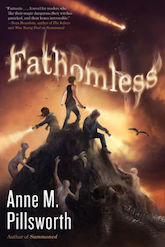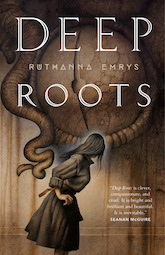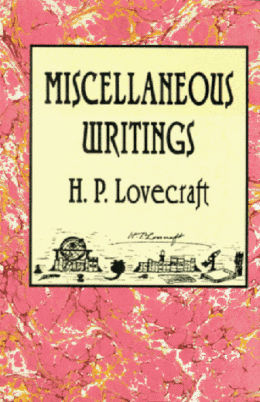Welcome back to the Lovecraft reread, in which two modern Mythos writers get girl cooties all over old Howard’s sandbox, from those who inspired him to those who were inspired in turn.
This week, we’re reading Lovecraft’s own “Sweet Ermengarde, Or, The Heart of a Country Girl,” written between 1919 and 1921 and first published in Arkham House’s 1943 Beyond the Wall of Sleep collection. Spoilers ahead.
“She was about 5ft 5.33…in tall, weighed 115.47 lbs. on her father’s corn scales—also off them—and was adjudged most lovely by all the village swains who admired her father’s farm and liked his liquid crops.”
Summary
(Ethyl) Ermengarde Stubbs of Hogton, Vermont, is the daughter of Hiram Stubbs, poor but honest farmer and bootlegger. Her years are but sixteen (despite scurrilous rumors she’s as much as thirty), her hair’s blonde (as long as the local drugstore doesn’t run low on supplies), her nose Roman and her eyes large and black. All the village swains swoon at her loveliness but she has two particularly ardent suitors.
Squire Hardman, who holds the mortgage on the Stubbs home, is rich and elderly, cruelly handsome, and ever equipped with a riding crop whether on horseback or not. His ardor for Ermengarde has been fanned by his discovery of GOLD beneath Stubbs’s acres. Let him win the maiden before her parents learn of their buried wealth and Hardman’s own fortune will be greatly increased! Alas for his sinister designs, handsome Jack Manly with his yellow curls has won sweet Ermengarde’s affections. One day Jack declares his passion and his determination to fight his way from poverty to fame and wealth for her sake. She declares her mutual passion. There is much passionate language on each side, then perhaps some heavy petting, on which our author draws the curtain.
Unbeknownst to the lovers, Squire Hardman observes their exchange from the bushes. He twirls mustache and crop and kicks a passing cat. Curses! He’s foiled! Or maybe not. He beards Stubbs Sr. and wife Hannah in their still cellar and delivers an ultimatum: Ermengarde marries him or he forecloses the mortgage on their old family home! Oh, how stricken the poor parents! What consternation when the happy young couple appears with their news of engagement! Jack soon remembers he’s a hero, however, and rallies. He will go off to the city and earn enough money to pay off the Stubbs’s mortgage, then return to lead his bride to the altar. The lovers exchange sweet nothings, including Ermengarde’s reminder of where darling Jack should buy her ring.
While manly Jack Manly seeks fortune in the city, his Ermengarde undergoes a series of sore trials of her own. Dastardly Hardman abducts her with the help of two of the shiftless scum who occupy a disreputable settlement outside Hogton. Though imprisoned there in a wretched hovel under care of a hideous hag named Mother Maria, Ermengarde still refuses to wed Hardman. One night, while contemplating the statue of Satan on his onyx mantelpiece, Hardman realizes he doesn’t need to marry Ermengarde to get the farm and gold—he can just foreclose and get it directly! Huh! So he apologizes and lets her go.
A party of hunters passes over the Stubbs farm shortly after. One, Algernon Reginald Jones, happens upon the GOLD!! He feigns snake-bite to insinuate himself into the Stubbs household. Being a polished sophisticate from the great city, he has no trouble convincing Ermengarde to elope with him. So much for Jack Manly, alas! So long for Algernon, alas, when as he sleeps, a love letter from another woman slips from his pocket and into Ermengarde’s hands. The perfidious deceiver, our simple country girl whispers, before pushing her seducer out the train window.
Alone in the great city, Ermengarde regrets not relieving Algernon of his wallet before pushing him out the window. Work is not easy to find. For a week she sleeps on park benches and stands in bread-lines. She tries to find Jack Manly, to no avail. Luck returns to our heroine when she comes across a costly (though cashless) purse. A card proclaims the owner as Mrs. Van Itty; when Ermengarde returns the purse, the aristocratic lady is delighted by the forlorn waif’s honesty and taken by her resemblance to her own child, Maude, stolen long ago. Mrs. Van Itty adopts Ermengarde and makes her an heiress, while elsewhere the Stubbses bewail the disappearance of their Ermie and Squire Hardman chuckles devilishly.
One day Ermengarde S. Van Itty hires a chauffeur who looks vaguely familiar. With a gasp, she realizes he’s Algernon Reginald Jones! Yes, he survived being pushed from the train, and married that other woman, who in turn ran off with the milkman and all his money. Now humbled, Algernon tells her about the GOLD on the Stubbs farm. This revelation moves Ermengarde to relieve her constant anxiety about her parents and finally motor home. She arrives just in time to stop Hardman from evicting the old folks from their house. Follows a joyous reunion for the Stubbs and much mustache and crop twisting dismay for the Squire. Wait! Who’s this coming up the walk?
It’s Jack Manly, worn and seedy yet radiant! He asks Hardman for a $10 loan to get things going on his farm, to which he’s brought his beauteous bride from the city, Bridget Goldstein. He apologizes to the Stubbs for not earning the money to pay off their mortgage, as promised. Never mind, says Ermengarde. Just forget those, ah, foolish fancies of our childhood.
Meanwhile Mrs. Van Itty’s been sitting in the motorcar. She eyes Hannah Stubbs. Memory clicks in place, and she shrieks that this is the “Hannah Smith” who was nurse to her Maude—who stole her Maude from the cradle twenty-eight years ago!! So if Ermengarde is Hannah Stubbs’s “daughter,” she must actually be Maude! Oh, Maude, come to your mother’s arms!!!
Ermengarde doesn’t jump into Mrs. Van Itty’s embrace. She’s been making quick calculations. If she admits to being Maude Van Itty, she can’t get away with that sixteen-year-old stuff anymore. And if she’s not Stubbs’ daughter, she can’t claim the gold on his land. Mrs. Van Itty is rich. But Squire Hardman is richer.
She sashays over to the dejected Hardman and murmurs that she’s reconsidered all. She loves him. She wants to marry him—or else she’ll have him prosecuted for kidnapping. Go on and foreclose on the Stubbs property and then enjoy the GOLD along with her—come on, dear!
And Hardman, the poor dub, does. The End.
What’s Cyclopean: Hannah Stubbs is an “agrestic matron.” Agrestic = rural, if you were wondering.
The Degenerate Dutch: “Ermengarde” plays around with a few sexist tropes—the hag, the leading lady who insists on her youth to all and sundry—which seems the natural effect of Lovecraft parodying a genre centered around binary gender, an aspect of humanity that he normally avoids in the absence of female co-authors. Ermengarde avoids the standard vulnerabilities of an eternally-sixteen heroine via her highly practical propensity for defenestration and blackmail.
Mythos Making: Nope.
Libronomicon: It’s not clear that anyone in this story is even literate.
Madness Takes Its Toll: All the characters demonstrate rather more common sense and clear thinking than most in their source material—if not more moral sense.
Buy the Book


Fathomless
Anne’s Commentary
Well, I guess this proves that the Lovecraft Joyce Carol Oates imagines in “Night Gaunts,” awesomely consistent in his shivering glumness, is not the historical Howard. Sometime between 1919 and 1921, Lovecraft sat down to write himself a rollicking send-up of all those sentimental/sensational melodramas that were as popular in the magazines and movie screens of the early twentieth century as they’d been in their counterparts of the nineteenth. I can see him snorting and chuckling over the pages of “Sweet Ermengarde,” from the choice of heroine name and his own pseudonym, Percy Simple, to the last line, in which our Ermie has reduced the diabolically powerful Squire Hardman to a mere “poor dub.” A dub, not a gug. The one is a clumsy fool and perpetual loser. The other builds great cities in the Dreamlands underworld and is not all that funny, especially if it gets you between its vertical jaws.
The central plot of “Sweet E” is one of those imbibed in the cradle, or soon after: Virtue Threatened by A (or THE) Big Bad. I remember enacting a miniature melodrama with my mother, which she might initiate at any time, and which went like this:
Mother (menacing mustache-twirling Big Bad): Who’ll pay the rent?
Me (pleading hands-wringing Virtue): I haven’t got the rent!
Mother (menacing leering Big Bad): Who’ll pay the RENT?
Me (swaying toward a faint Virtue): I haven’t GOT the rent!!
Mother (triumphant Big Bad): WHO’LL PAY THE RENT?!
Me (nick-of-time Hero): I’LL pay the rent!
Mother (crushed into dirt Big Bad): Foiled!
Me (Virtue revived): Saved!!
Yeah, we were the undiscovered Barrymores, American theater’s greatest loss. Later I’d see the cartoon twin of our drama on Bullwinkle’s Clubhouse, when Boris Badenov produced a play called “She Can’t Pay the Rent.” And the Hero who pays the rent is…Dudley Do Right! Who is the latter day cartoon equivalent of Jack Manly, as Nell Fenwick is the Ermengarde and Snidely Whiplash the Squire Hardman.
Still later, I’d read book after book in which the Virtue Threatened/Virtue Saved (Or Not/Tragic Variation) Plot appeared, some “popular” fiction, some “proper” literature. I liked best the ones where Virtue ended up saving herself, at least in part. In the eighteenth and nineteenth century, she did this most often by dogged patience and endurance. Not to be knocked, but I liked bestest the more active Virtues, with a certain weak spot for those who might not be so purely Virtuous, because let’s face it. Sometimes the Big Bads and even the Lesser Bads deserve a dose of their own medicine. You know these More Or Less Virtuous heroines. My own favorites are Becky Sharp of Thackeray’s Vanity Fair and Undine Spragg of Wharton’s Custom of the Country.
Of “Sweet E,” what can I say? Solid send-up of its target, check. Has its grin-and-chortle moments for me. And, best of all, it has a Virtue Threatened who is not really all that sweetness and light—neither sweet sixteen nor naturally light-hued of locks. Her only gullible moments are when the plot demands them, but hey, the same is true of Big Bad Hardman, for whom it is a conveniently delayed realization that he can just foreclose on the Stubbs to get their GOLD-bearing land, Ermie be damned.
Good for you, Howard, for making your Virtue Threatened no lamb led toward slaughter, played for laughs via her excesses in swooning but a vixen in lamb’s clothing, clever enough to calculate under pressure which dub will prove the most lucrative in the long run.
Buy the Book


Deep Roots
Ruthanna’s Commentary
As of last week, all I knew about this obscure piece was that Anne considered it “for Lovecraft completists.” I imagined some particularly low-quality and incomplete bit of juvenilia. I was… a little off-base. By a few light-years.
I started out amused, agreeing with the Daniel Harms review that it was “actually quite funny at places.” I have basically no resistance to pedantic asides in comic fiction at the best of times, and my sense of humor has grown steadily more juvenile over the course of a stressful week, so I may not be the best judge here. But by the point where Squire Hardman twirls his mustache and his riding crop in tandem, while kicking an innocent cat, I was laughing out loud and sharing passages with my slightly dubious wife.
I also have no resistance to parodies in which characters undermine the standard plot by being resolutely sensible and unsentimental. Villains who realize they could cut out their whole ornate scheme and get the gold by foreclosing! Heroines who fall prey to city slickers, but defenestrate them the moment they prove unfaithful! (And then wish they’d been even more sensible and stolen a wallet first.) Narrators who stop to explain what part of speech “still” is in a particular sentence, lest the reader become confused!
I feel like I’m probably missing whole levels of pedantic joke in here. There are infelicitous word choices that I suspect of being deliberate, lines of dialogue left ambiguous as to whether they’re spoken by characters or the narrator, sudden shifts in formality of language. Lovecraft’s been known to do this sort of thing before, making fun of his own subgenre and writing quirks. (I’m thinking particularly of the eyebrow-raising cyclopean count in “Out of the Aeons.”) I tend to be suspicious when writers turn to mocking subgenres they don’t love, but in this case it’s kind of glorious.
Speaking of which, I have this sneaking feeling that Lovecraft’s trolling the reader when he calls out a character for pronouncing “ideal” as “i-deel.” It certainly worked, since I spent an amount of time I won’t report here first demanding how the hell one is supposed to pronounce it, and then listening to several recordings of such pronunciations. Ultimate conclusion: either a very successful trolling attempt, or very weird phonemic shifts among the upper crust of Providence society.
“Sweet Ermengarde” has the distinction of being the least well-documented of Lovecraft’s writings. It’s down as being written between 1919 and 1921, based solely on quirks of handwriting. That’s approximately somewhere between “Beyond the Wall of Sleep” and “The Music of Erich Zann,” for those keeping track at home. He doesn’t seem to have shared it with anyone, though how he resisted I have no idea. He seems instead to have stuck it under a rock until Arkham House pulled it out for a short story collection in 1943. (And no, I’m not clear what role the “Percy Simple” pseudonym plays, given this non-publication history. Maybe someone here can enlighten me?)
Last thought: Not sure what to make of Manly randomly marrying a Jewish lady at the end, except that it seems like a good idea and the story doesn’t seem to hold it against her. And in fact she seems to be the only person not scheming for money in the last scene, so we’ll let it slide.
Next week, we find some remarkable additions to the Libronomicon section in Ada Hoffman’s “The Mother of All Squid Builds a Library.”
Ruthanna Emrys is the author of the Innsmouth Legacy series, including Winter Tide and Deep Roots. Her neo-Lovecraftian stories “The Litany of Earth” and “Those Who Watch” are available on Tor.com, along with the distinctly non-Lovecraftian “Seven Commentaries on an Imperfect Land” and “The Deepest Rift.” Ruthanna can frequently be found online on Twitter and Dreamwidth, and offline in a mysterious manor house with her large, chaotic household—mostly mammalian—outside Washington DC.
Anne M. Pillsworth’s short story “The Madonna of the Abattoir” appears on Tor.com. Her young adult Mythos novel, Summoned, is available from Tor Teen along with sequel Fathomless. She lives in Edgewood, a Victorian trolley car suburb of Providence, Rhode Island, uncomfortably near Joseph Curwen’s underground laboratory.










